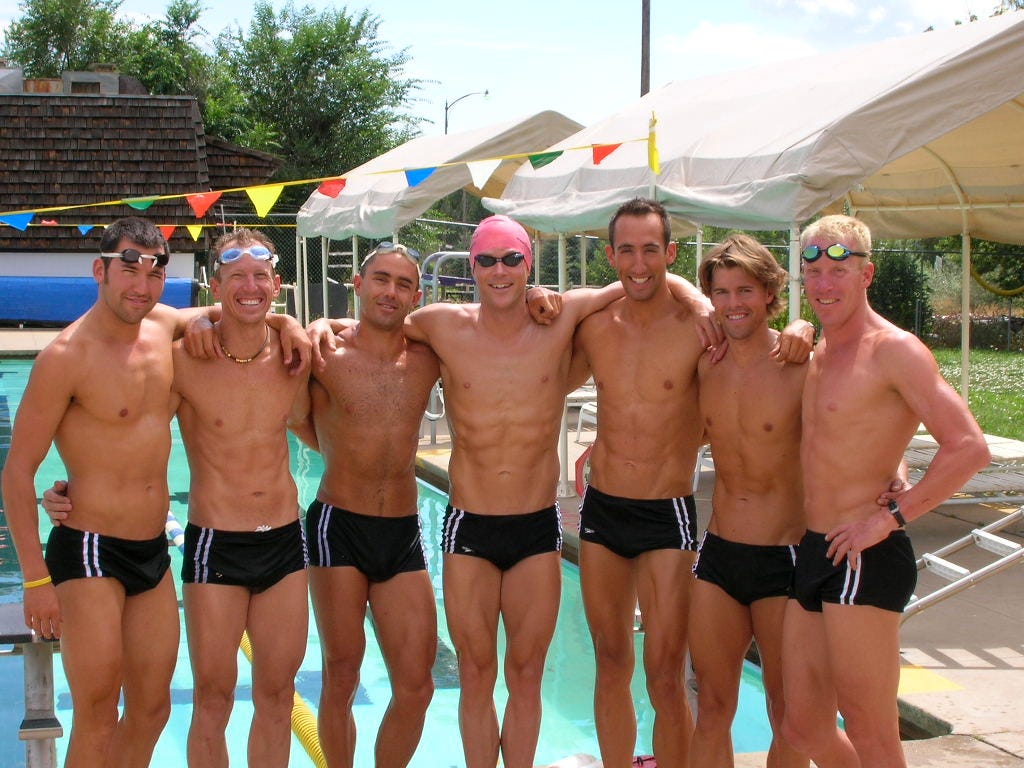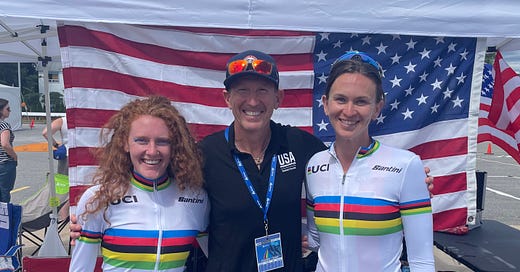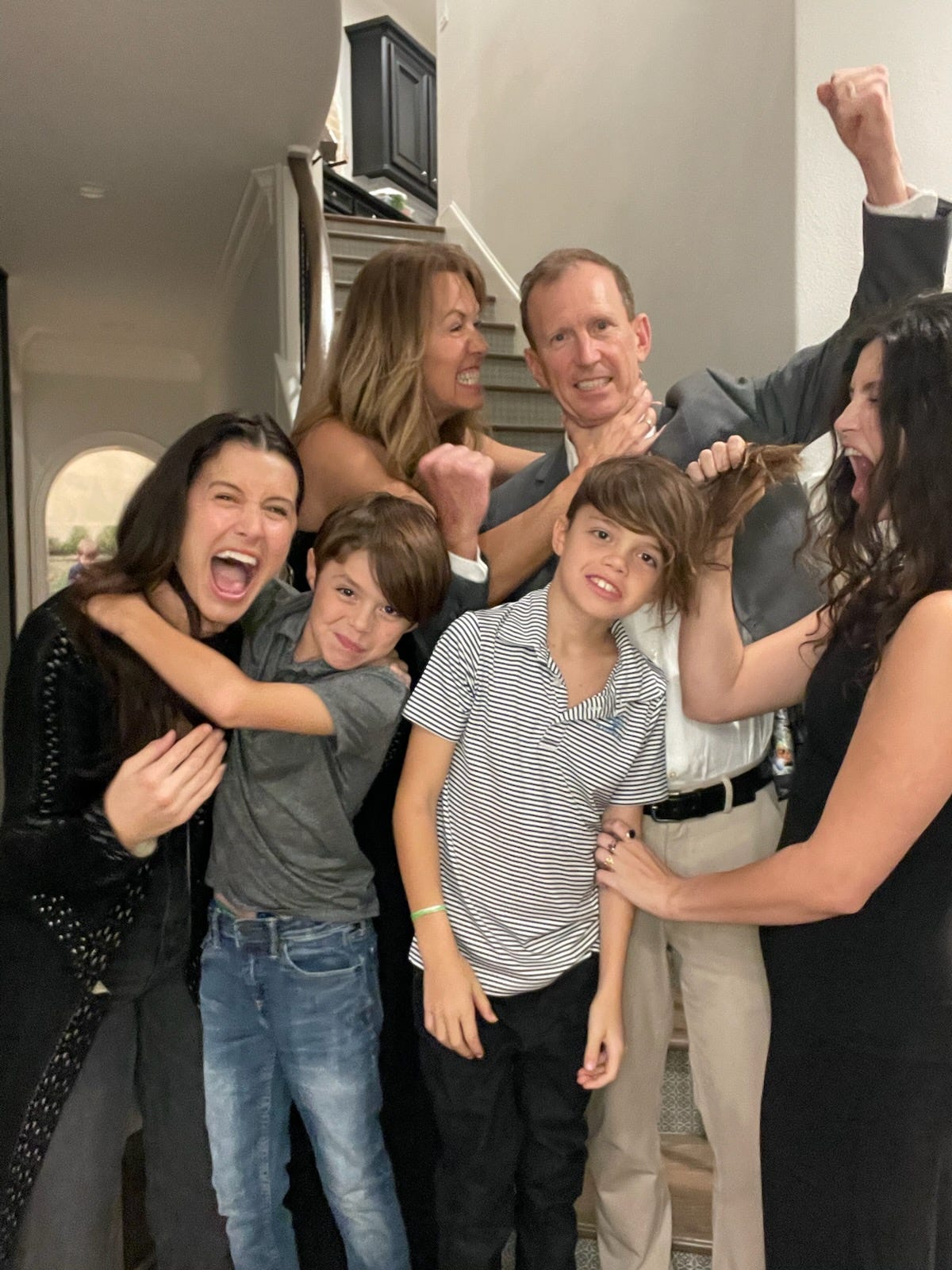I met Jeff in 2004, he invited me to give a talk to the Winton-Salem Triathlon Club.
Clas Björling and I had finished a triathlon tour across the USA and were “in the neighborhood.” The talk sparked a friendship.
Over the years, Jeff & I have done a lot of training together. What sets Jeff apart is not his training performance. What sets Jeff apart is his ability to generate superior race performance given the constraints of his life.
Specifically, he’s qualified for the Ironman World Championships numerous times and his life didn’t fall apart.
Full Time Surgeon (7-10,000 wRVU)
Teaching New Doctors
Admin Responsibilities As His Career Scaled
Husband to Erin
Father
I interviewed Jeff to learn lessons working athletes can apply to get more fitness to the finish line.
In addition to his own training, Jeff has experience working with athletes at the highest levels of competitive sport.
There’s a lot for us to learn and I’m excited to share this article with you.
The High-Performing Amateur
Q: What can you tell us about getting the most out of yourself when taking call and holding down a career. You did this better than anyone.
A: I don’t see having a serious job and training to compete at a high amateur level as two separate things. Having both allows me to be the best version of myself.
Erin (Jeff’s wife) has seen me at different times totally focused on work and training. She prefers me doing both and is the one who first pointed out to me that I’m more at peace juggling the two.
Training provides stress relief when I’m experiencing work stress; alternatively, the mental challenge from my job allows me to successfully complete the sometimes boring job of getting the physical work done during training.
During the long slow training…my mind is often going a hundred miles an hour. I accomplish great thinking during my long sessions. If I had more physical gifts then I’m not sure if I would have continued in medicine. But I really enjoy the intellectual challenge of medicine and I’m particularly attracted to the nobility of the profession.
I’ve had two opportunities to test the concept of a singular focus on sport.
Golf
Triathlon
I played collegiate golf. My practice and success (at golf) suffered from the school requirements of being in a 6-year medicine program out of high school. In College, I never devoted the effort to be the best golfer that I could be.
I had an opportunity to do that after my internship year. I played better golf than ever and had a sense of where that would get me. I felt I could likely scrape by as minor pro if I really ground it over a decade.
But I’m incredibly practical, and the fear of poverty and the lack of personal fulfillment with that achievement directed me back into medicine. Similarly, I felt like my foray into triathlon reached a similar conclusion.
In summary, I don’t think I could be happy choosing just one focus. I enjoy bouncing between the mental challenges of my work and the physical challenges of competing. They are never really in balance; more in harmony. Each of them requiring more attention at times.
Of course, we haven’t talked about family, which injects an entirely new set of challenges and focus.
From a time management standpoint, I have a few reminders for myself.
Don’t think, do.
Don’t obsess over perfection in either training or work; just get started
Be efficient with transitions and reduce dead time
Hire out chores
Write out a schedule, but be flexible
Start every day with a win, whether it is work or training related
Getting The Daily Win
Jeff taught me two concepts.
No Zeros
30-for-30
No Zeros is simple.
Never have a day where you put a zero in the training log.
Jeff’s Hotel Room Workout1
100 Push Ups
100 Sit Ups
100 Squats
Best done first thing in the morning. Then relax with whatever the workday brings.
30-for-30 can be applied to anything.2
Jeff applied it to running.
30 runs
30-minute minimum duration
30 days
There will be times in our lives when it’s not possible to train as much as we want.
Don’t Quit
Find A New Way To Win
The 30-for-30 game requires 15 hours a month and yields results.

Living Like A Pro
Jeff took a Sabbatical in the Summer of 2007. He moved to Boulder and trained alongside me.
Q: In The Tired Athlete, John Hellemans shared his experience with taking a break from medicine to concentrate on training for the Commonwealth Games. You did something similar and had a better go of it. What lessons did you take away from living like a pro?
A: Despite the conclusions that I arrived at regarding a singular focus on sport, the best decisions of my life were to explore both golf and triathlon at a high level. The sabbatical in Boulder was by far the best experience.
In my golf adventure, I was 25 years old with a lot of medical school debt, alone without any guidance. I was living in the Midwest (not ideal environment for golf) and lacked proper golf facility access.
In Triathlon, I was financially stable, part of an incredible team, living in the mecca of endurance sport. I had a friend and mentor guiding the experience. It was a front seat watching what singular focus looks like.
Contrasting the two experiences highlights what I needed to reach my fullest potential.
Focus: I was able to surround myself with the best resources and people to improve at sport. It all became easier when excuses and distractions were eliminated.
Leveling Up: I left Winston-Salem as “just one of the guys” and returned with a base of knowledge, fitness and beliefs that allowed me to experience a new level in the sport.
Results: I arrived in Boulder as a solid IM finisher and left as a perennial podium athlete with decent amateur success.
An unexpected benefit of the sabbatical was the opportunity to write about my experiences. Having not previously journaled, the sabbatical afforded me the time to write. To this day, I enjoy reflecting on the memories I recorded.
Coaching Doctors With Call
Call is unpredictable, Jeff’s strategy was to make it more predictable.
Take M/W Call, Weekly
Take Weekend Call Every 5th Week
His partners loved it and, as a result, they gave him:
Flexibility to leave on the days following call
Predictability on his non-call days
Control of his schedule
Jeff uses a coach (me in the past & Alan Couzens today).
The role of the coach is to set the Size & Scale of the workouts.
Jeff moves the workouts based on his recovery and schedule.
His advice, “Don’t sweat the precise schedule. Get the work done.”
Flexibility - Predictability - Control
The Neurotic Athlete
Q: You do well coaching, and treating, OCD and neurotic athletes. What are your best tips for those of us who are challenged by the mental side, as well as the people who live with us?
A: Start by listening and seeking understanding of where the athlete is coming from.
Deeply understand the athlete’s ultimate goal and, together, seek out what is required to get to the ultimate goal.
When the near-term obsessions arise:
Agree
Redirect To The Ultimate Goal
Pivot the athlete towards the role of health in being able to do the training required for the Ultimate Goal.
Playing off this focus on health, look to shift the obsession towards:
Strength
Recovery
Put together a shopping list of “better obsessions” then reassure with the following messages:
The amount to “get there” is more than what it takes to “stay there.”
We only start from zero once.
The accumulated years of training give an enduring advantage.
The Long Term Athlete
Q: What do highly motivated athletes need to watch over the long term? What do most athletes miss about their lifestyle choices?
A: From a medical perspective, I think highly motivated athletes have the same needs as everyone else. They need to care for their physical, emotional and mental health. The needs are the same, but room for error and the pressure of success make that more difficult.
I believe optimized health/wellness leads to long-term sports performance. So in simple terms, be healthy!
There has been a sweeping change in elite sport recognizing the importance of mental health. When you look at the factors that lead to elite performance, it all centers around being in the sport for a long time.
The only way to achieve that is to:
Remain Healthy
Build A Strong Social Support System
Mental Health has become socially acceptable to talk about. It is as serious as the physical training.
You’ve talked about the demons fueling the training; I think this is common. There is also the concept of manufacturing hardship. I was describing this tactic to JD3, who provided the term to me. I think both of these are true; but I also believe that if you are in it for the long haul, there has to be more than that.
It is also hard to transition away from the things we associate with “fun.”
Drinking & Overeating, etc. are easier to eliminate as we age, but the earlier you can do it, the better.
Mobility & Strength are what I concentrated on as I prepared to take the sabbatical in 2007. I began a routine 6 months before arriving in Boulder with daily yoga and weekly strengthening. It was the basis for surviving the training. I always go back to it when in a slump or preparing for another event.
Preparation Before Focus Blocks: To get ready for my sabbatical took 6 months. Before I started the focus block, I organized my life, finances and family.
Final Word
Jeff’s work puts him in contact with the full range of human performance.
World & Olympic Champions,
Families seeking help so their kid can walk, and
Everything in-between.
He ended the interview with this advice.
Everyone should maintain their perspective by working across the full spectrum of human abilities.
Jeff’s CV
Dr. Jeffrey Shilt is the Community-in-Chief at Texas Children’s Hospital and a Professor of Orthopaedic Surgery at Baylor College of Medicine, Department of Orthopedics. He is currently the Medical Director of the Motion Analysis & Human Performance Lab and serves as the Pediatric Sports Medicine Liaison to the United States Olympic and Paralympic Committee and the Chairman of the Medical Advisory Board for USA Cycling.
Dr. Shilt previously served as the Residency Director for Wake Forest University Orthopaedic Surgery program. While at Wake Forest, he participated in pioneering work in the treatment of children with spastic cerebral palsy, as well as work in tissue engineering in the field of sports medicine.
Dr. Shilt served as team physician for USA triathlon at two world championships and for a professional cycling team. Dr. Shilt remains clinically active in sports medicine, serving as the national team physician for USA Paracycling medical consultant for World Champions, Olympians, and multiple professional endurance athletes. Dr. Shilt has significant experience across the biomechanical spectrum, ranging from elite athletes to those with severe gait impairments found in cerebral palsy. His research interests include management of spasticity in cerebral palsy, sports performance and the treatment of endurance sports injuries.
Back To Table of Contents
Now that we’re both in our mid-50s. The minimum workout standard has been reduced to 20/20/20.
You can find Jeff’s write up on the 30-for-30 run game here. It works.
Justin Daerr, past winner of Ironman Boulder.












Not only exceptional at career and sport but also a great human!